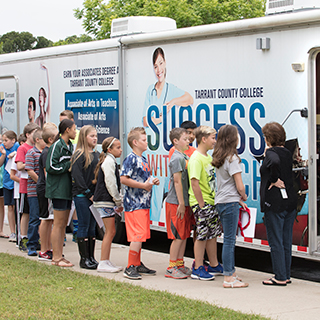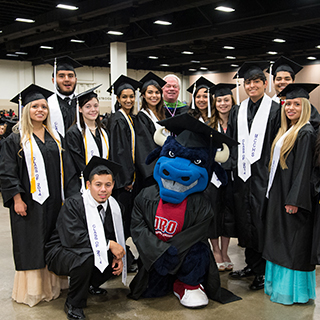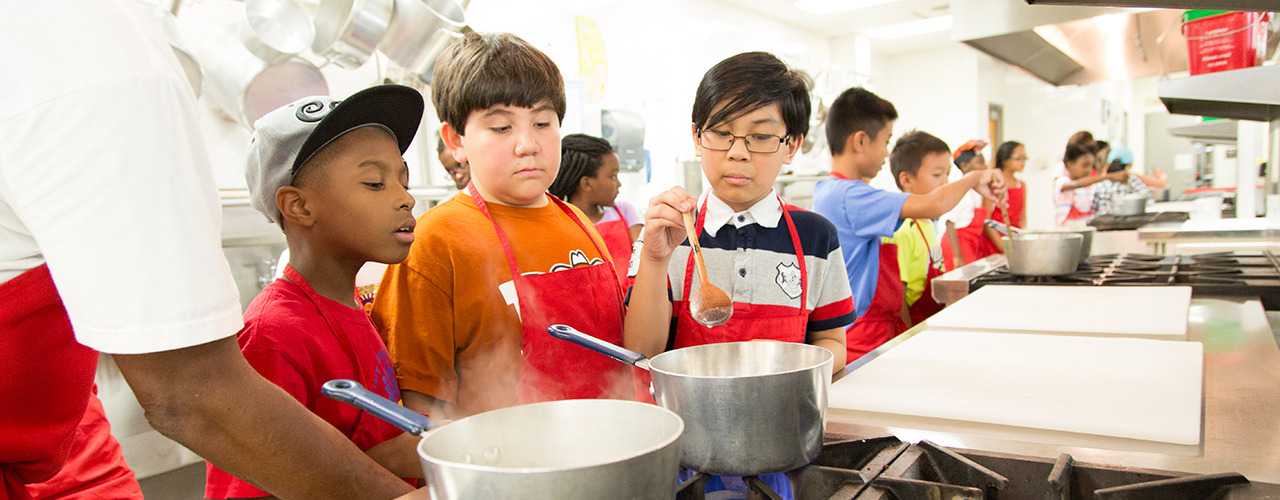Creating a College-Going Culture
Many people associate Tarrant County College with its role as a primary trainer for the North Texas workforce or an affordable start to undergraduate education. But TCC is reaching area residents long before they finish high school.
“We connect with students at every age,” noted Joy Gates Black, vice chancellor for academic affairs and student success. “It helps them see themselves as future college students.”
Whether it’s a year or a decade away, preparing for higher education is essential. The Texas Higher Education Coordinating Board’s strategic plan, 60x30TX, calls for at least 60 percent of Texans aged 25 to 34 to hold a college certificate or degree by the year 2030 to ensure competitiveness and prosperity.
The challenge is significant. In 2013, only 38 percent in the 25-to-34 range had a postsecondary credential. TCC offers a variety of pre-college programs to build a college-going culture—a mindset that college is more than a possibility; it is an expectation.
“The way we meet 60x30TX goals is to develop better pathways for our students, and that begins early,” said Gates Black.
“When we connect with children starting in elementary school, there’s a natural progression to higher education. That’s especially important for those who will be the first in their family to go to college—and frequently those students are part of our fastest-growing populations.”
Joy Gates Black
 One of TCC’s most visible youth programs is College for Kids, a summer enrichment program that includes academic, technology, arts and fitness
classes for grades 1 through 8. The College also hosts TexPREP (Texas Prefreshman Engineering Program) in the summer for middle and high school
students. Offered in partnership with The University of Texas at San Antonio, TexPREP
gives students high school credit, college preparation and a head start on skills
needed for science, technology, engineering and math (STEM) careers.
One of TCC’s most visible youth programs is College for Kids, a summer enrichment program that includes academic, technology, arts and fitness
classes for grades 1 through 8. The College also hosts TexPREP (Texas Prefreshman Engineering Program) in the summer for middle and high school
students. Offered in partnership with The University of Texas at San Antonio, TexPREP
gives students high school credit, college preparation and a head start on skills
needed for science, technology, engineering and math (STEM) careers.
Younger students’ exposure to TCC isn’t limited to summer. The College Access and Community Outreach team works with area districts and community organizations to have a presence in elementary, middle and high schools as well as at family events. TCC’s Mobile Go Center made more than 80 visits last year, connecting with some 10,000 youth.
“The Mobile Go event offered scenarios of life after high school and illustrated the significance of a post-secondary education and college degree,” explained Rozlyn Faulhaber, counselor at Irma Marsh Middle School, part of northwest Fort Worth’s Castleberry ISD.
“We are fortunate that TCC realizes and embraces the necessity of implementing college readiness for the youngest scholars.”
Rozlyn Faulhaber
TCC’s mascot, Toro the Trailblazer, also plays an important role in the college-going culture. In addition to his TCC appearances, Toro accompanies Mobile Go to K-12 schools and community celebrations. Initially, children may know him only as a big stuffed animal, but they come to associate him with pride, excellence and higher education.
 “Toro excites younger students about college,” said Noemi Vela, director of College
Access and Community Outreach. “When kids see Toro, they see themselves at TCC.”
“Toro excites younger students about college,” said Noemi Vela, director of College
Access and Community Outreach. “When kids see Toro, they see themselves at TCC.”
College is a relevant consideration earlier than ever. Discussions of career interests and related skills take place in middle school in preparation for selection of an “endorsement”—a pathway to Texas high school graduation tied to a specific career cluster—during ninth grade.
The Dual Credit program allows high school students to simultaneously earn high school and college credit in Core and technical subjects. Unlike Advanced Placement classes (which are taught by high school faculty and require students to achieve a certain exam score to get college credit), Dual Credit is taught by College-credentialed faculty on high school or TCC campuses, and credit is attained by successfully completing the course.
Through Dual Credit, students can finish a year or more of college by high school graduation. Not only does that save time, but it also saves a significant amount of money—as they earn transferable credit at affordable TCC prices. Some districts even cover the cost of tuition for their students. If those students finish a year of college that they would otherwise complete at the average state university, they save nearly $9,000 in tuition and fees, plus incidental costs.
For a growing number of students, there is an opportunity to complete a tuition-free associate degree during high school. Early college high schools (ECHS) enable students to complete up to two years of college, or the entire Core Curriculum. Each of TCC’s physical campus locations now houses an ECHS in partnership with an area school district.
“These programs provide intellectual, social and physical integration of high school and college,” said Benjamin Leos, principal of Marine Creek Collegiate High School on Northwest Campus. “We reduce the intimidation of attending college and give students access to more academic support and career planning services.”
Since the first class graduated in 2014, Marine Creek Collegiate High School has maintained a 100 percent high school graduation rate. Associate degree achievement is increasingly impressive: 68 percent of graduates in 2014, 70 percent in 2015 and 91 percent in 2016. The average Marine Creek student graduates with 71 transferable college hours.
TCC’s involvement with high schoolers extends beyond programs that result in college credit. College Access provides seniors step-by-step guidance through admissions, financial aid, advising and more; the program paved the way to enrollment for almost 3,000 students last year. Upward Bound is a federally funded TCC program that annually provides approximately 200 high school students intensive academic support, mentorship, leadership development and college preparation.
“The continued increase in participation in our youth programs is a reflection of their value for students,” said Gates Black. “Children learn about the importance of education, how to establish goals and what it takes to achieve them. And that will benefit them their whole life.”
That’s certainly true for Ariana Hartman, who first became involved with TCC as a College for Kids participant in elementary and middle school. When Hartman went on to Seguin High School in Arlington, she enrolled in Dual Credit—earning college credit in psychology, sociology, history, economics, government and English.
“Being on a college campus as part of College for Kids built my confidence,” she said. “And then Dual Credit allowed me to experience college classes before actually making that transition.”
Today Hartman is a student at the Southeast and Trinity River campuses, majoring in Human Resource Management and planning to transfer to a university. Challenging classes don’t faze her. “I feel like I had a preview of college in my early years.”


![//parameter[@name='author']](/magazine/assets/images/authors/alexis-patterson.jpg)